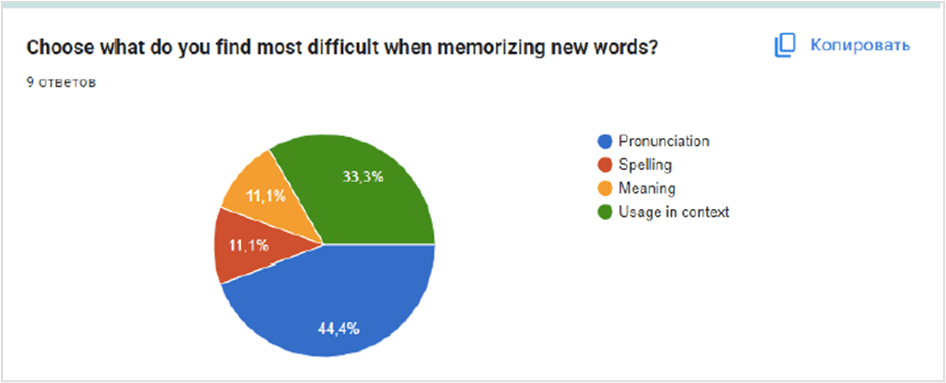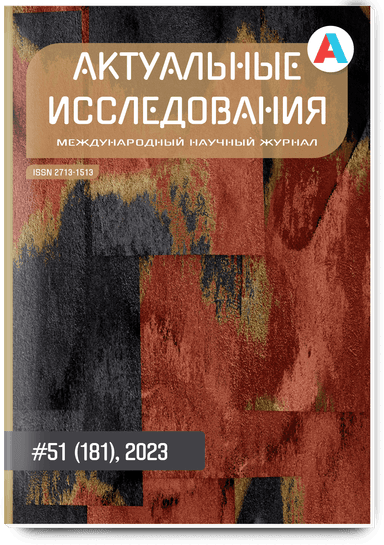Introduction
The research of foreign languages represents a critical avenue within contemporary vocational formation. The objective of such education is to cultivate a human actor capable of operating within an immense stream of information, possessing the capacity to engage with diverse literary materials, and adapt at mastering novel technologies [1]. As part of this development, teachers must foster their students' imaginative abilities, thereby promoting creative thinking as an integral component of their growth. The cultivation of an active, autonomous, and adaptable persona that can effectively engage in cross-cultural communication via a foreign language not only is a valuable outcome of language teaching, but also its main goal.
Literature review
Vocabulary is a vital constituent of linguistic communication, playing a profound role in human existence. It facilitates the exchange of information and ideation between interlocutors, allowing for the expression of thoughts, feelings, and the shaping of worldviews and cultural identities. Vocabulary comprises semiotic units possessing diverse significations and functions, deployed across diverse contextual domains and spheres of lived experience. Lexical complexity and specialization is contingent upon multifarious determinative factors. The lexicon influences communicative acts, cognitive processes, and behavioral patterns, constituting identities and social positionalities. As the fundamental building blocks of oral expression, the role of the lexicon in foreign language acquisition is equally as significant as phonological and grammatical competencies [4]. It serves to transmit and receive the substance of utterances. Fundamentally, it is through vocabulary that notions are conveyed via its nominative capacity, permeating all realms of life to reflect not solely objective realities but also imaginative conceptualizations [2]. In other words, vocabulary represents an integral link between the world of ideas and empirical reality. Ultimately, it is the words and terms constituting the lexicon that transmit the immediate subject of thought.
When acquiring a foreign language, learners face difficulties related to vocabulary, which can make it challenging to master the four language skills of listening, speaking, reading and writing. For example, students may know how to pronounce a word but not know its written form or know the meaning of a word but not how to use it. Therefore, the process of mastering a word is complex and according to Nation «What is Involved in Knowing a Word» (2001) [3] there are three different essential aspects: form, the next one is meaning and use of the word; it can be represented in the figure illustrated below (fig. 1).
 Fig. 1. What is involved in knowing a word?
Fig. 1. What is involved in knowing a word?
When the teacher understands the aspects of a word, namely form, meaning and use, it allows him/her to identify students' strengths and weaknesses in English in terms of these three aspects of vocabulary knowledge [3]. In order for students to learn new vocabulary more effectively, the teacher should emphasize which aspect of the word is acquired better. After all, if a student has a rich vocabulary, it allows him/her to feel confident, to express his/her thoughts and ideas more richly and makes him/her convincing and professional when communicating with other people.
That is why the goal of expanding students' vocabulary is an essential educational task not only in the subject area, but also in school education in general. Thus, vocabulary development is a complex problem of education. Possession of a rich vocabulary will allow a student to realize his/her educational potential in the majority of disciplines. The need for constant vocabulary development is also conditioned by the fact that the word, being the central unit of language, performs the most important function of a resource with the help of which the cognition of reality is carried out. Thanks to words, a child gains knowledge of the world, communicates, develops his/her thinking and intellect [5].
Methods
To indicate the main difficulties that exist and are needed to be improved, the online-questionnaire was modelled. The online questionnaire consisted of five questions aimed at identifying the lexical difficulties that secondary school students may be faced with. Participants were 7th grade Russian female students between the ages of 12-13 years old. The received data helped to analyse possible causes and ways of improving the teaching process. The overall aim of the questionnaire is to identify the students’ specific difficulties, their favourite lexical exercises and least favourite in the process of vocabulary acquisition. The focus group consisted of 9 members who studied a foreign language (English) in the group.
The questionnaire was held in an online form, using the survey software «Google Form». The questionnaire consisted of closed questions. The questionnaire was aimed at gaining quantitative data for further analysis.
Results
The research results will be provided by data from the questionnaire and statistical analysis. According to the received data (fig. 2), the first question «What do you find most difficult when memorising new words?» showed us that the majority find spelling to be the most difficult aspect when memorizing new words, as it accounts for 44.4% of the responses. Pronunciation and usage in context are tied as the second most challenging aspects, each with 22.2% (or two students), and meaning is considered the least difficult, with 11.1% (or one student).
 Fig. 2. Results of the focus group
Fig. 2. Results of the focus group
The objective of the second question was to concerns the methods used by students to improve vocabulary memorization. From the chart, we can conclude that among the students, there are two equally preferred methods for memorizing new words: using online dictionaries or context, and using repetition and contextual memorization, each favored by 44.4% of the participants. In contrast, a significantly smaller portion of the respondents (11.1%) prefer expanding their vocabulary by reading books and articles in English. This data suggests a preference for immediate, applied learning techniques, such as contextual usage and repetitive memorization, over indirect learning through reading.
The third question contained information about how students rated their vocabulary level. 5 students describe their knowledge «I know a lot of words, but rarely use them during the lessons», 3 students evaluate their level «I think my vocabulary is limited, I find it difficult to express my thoughts during the lessons» and only one student chose the answer «I know a lot of words and often use them during the lessons».
Results of the questionnaire (questions 4-5).
This block of questions was aimed at identifying students' preferred and disliked memorization exercises. The following responses were received: the most popular vocabulary-related exercise among the respondents is word association games, with 8 out of 9 participants (88.9%) favoring it. The second most popular activity is crossword puzzles, which is preferred by 6 out of 9 respondents, representing 66.7%. Synonym and antonym matching, as well as reading comprehension exercises with new vocabulary, both have 3 out of 9 participants (33.3%) enjoying them. No respondents chose word roots and prefixes/suffixes exercises as their favorite. It can be concluded that the respondents show a clear preference for word association games and crossword puzzles over other vocabulary exercises. Based on the bar graph presented, the least favorite vocabulary-related exercises among the respondents are «Word roots and prefixes/suffixes exercises», with 5 out of 9 responses, accounting for 56.9%. The next least favorite is «Reading comprehension exercises with new vocabulary», with 4 responses (44.4%), followed by «Word association games» and «Synonym and antonym matching», each with 3 responses (33.3%). «Crossword puzzles» are the least selected as a least favorite activity with only 2 responses (22.2%).
Discussion
Discussion is based on the results of the questionnaire held and evaluated in the Section Results.
One of the study results is that there is a range of vocabulary levels among the students surveyed. While some students feel confident in their vocabulary knowledge and usage, others struggle to express themselves during lessons due to limited vocabulary. This highlights the importance of ongoing vocabulary development and support for students who may need extra assistance in this area.
Another key moment that teachers should take into consideration is that among the respondents, using online dictionaries or context and reading in English are equally popular methods for learning new words, while a smaller percentage relies on repetition and contextual memorization techniques. Moreover for better and more effective vocabulary acquisition, teachers should use word association games and crossword puzzles, as they were chosen as one of the most favorite among students.
Conclusion
The study shows that the main challenges of the target learners are difficulties related to pronunciation and usage of words in context. Teachers and instructors can enhance the teaching strategies by implementing interactive technologies and activities, as evidenced by the obtained data. The incorporation of teaching strategies should be linked to the thorough planning of individual lessons.
From a practical view point, the study provided data on the issues of most favorite exercises and least favorite among students, highlighted the importance of vocabulary teaching, and noted the difficulties students may encounter during this process.
Further investigations are needed to find out which exercises and other tools lead to better acquisition of new vocabulary.

.png&w=640&q=75)